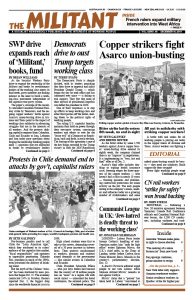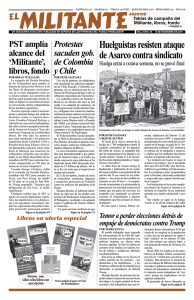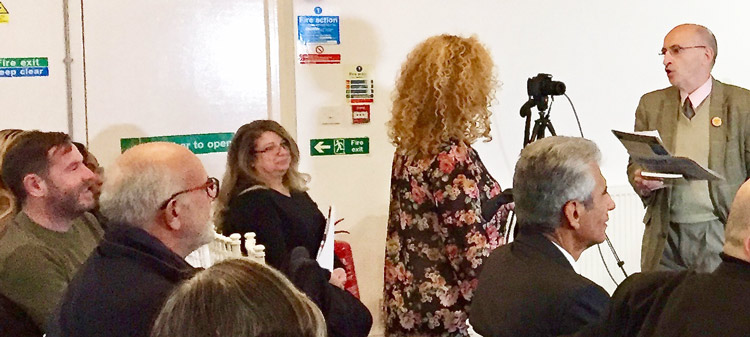LONDON— Labour Party leader Jeremy Corbyn’s handling of anti-Semitism makes him “unfit for high office” writes Ephraim Mirvis, the U.K.’s chief rabbi, in the Times of London, weeks before Corbyn faces Prime Minister Boris Johnson in the country’s parliamentary election, Dec. 12.
A Jewish Chronicle editorial urged people to not vote Labour, while Johnson utilized Mirvis’ remarks to rail against Corbyn.
Mirvis’ claim that a “poison” has taken hold in Labour “sanctioned at the very top,” is contested only by the Labour leader’s most devoted backers. They claim he just opposes Israel’s attacks on Palestinians.
But Corbyn has associated with Holocaust deniers and defended an anti-Semitic mural that depicted Jews conspiring to control the world on the backs of exploited and oppressed. He has described as “comrades” and “friends” leaders of Hamas, an organization that advocates the killing of Jews and the destruction of Israel. He has participated in a commemoration of the terrorists who murdered Israeli athletes at the 1972 Munich Olympics. He protects Labour Party leaders who have slandered Jews.
When asked Nov. 26 by BBC interviewer Andrew Neil to apologize for the party’s record of anti-Semitism, Corbyn declined. Since he became Labour leader in 2015, thousands of middle-class radicals who call for the destruction of Israel have joined the party. Thirteen Labour Members of Parliament have resigned from the party, citing its leadership’s refusal to combat anti-Semitism.
CL: ‘No to Jew-hatred’
The Communist League is standing its own candidates against the Conservatives and Labour, the U.K.’s main capitalist parties. As it explains why workers need to organize independently of the bosses and their parties, the CL’s campaign program points to the necessity of combating Jew-hatred.
And its candidates — this worker-correspondent in Tottenham, London and Caroline Bellamy in Wythenshawe and Sale East in Manchester — build solidarity with working-class struggles, like the strike underway today by workers at South Western Railway against bosses’ attacks on safety, jobs and the Rail, Maritime and Transport union, and protests demanding the removal of flammable cladding that still covers thousands of homes two years after 72 people died in a fire at Grenfell Tower.
In response to an inquiry about the CL’s stance on anti-Semitism and Israel from the Britain Israel Alliance, I wrote that the CL “considers Jew hatred to be a poison. It’s advanced especially by middle-class forces both on the ultra-right and on the left who perpetuate the ‘Jew-money’ myth.”
Casual anti-Semitism among working people is low today, but when the class struggle sharpens Jew-hatred will be utilized by the rulers to try to save their capitalist system.
“Anti-Semitism divides working people,” the CL’s letter to the BIA explains. “Only through mobilizing united working-class struggle and solidarity can we meet the efforts of the propertied rulers to make working people pay for the crisis.”
The CL’s candidates condemned the beating of an unnamed rabbi in Stamford Hill, London, Nov. 29. Assailants shouted, “Kill the Jews,” as they repeatedly punched him, neighborhood watch group Shomrim reports.
In his denunciation of Corbyn, Mirvis states that anti-Semitism runs counter to what he calls the “British values of which we are so proud.” But the country is divided between conflicting classes, with opposing class values. While many workers took to the streets in the 1930s to fight forces organized by Jew-hating fascist leader Oswald Mosley, Britain’s capitalist rulers and their political representatives have a long record of anti-Semitism.
The government’s 1905 Aliens Act, passed with bipartisan support, was aimed at cutting entry to the U.K. by Jews, whose numbers there were growing, following pogroms in Central and Eastern Europe.
The British government restricted immigration by Jews fleeing Nazi persecution in the 1930s — both to the U.K. and to Palestine, which U.K.’s imperialist rulers controlled at the time.
Three years before he became Britain’s prime minister, Winston Churchill described Jews in 1937 as “a little state within the state” who brought persecution upon themselves and said that leaders of the Russian Revolution sought “a worldwide communistic state under Jewish domination.”
Ernest Bevin, foreign secretary in the post-World War II Labour government scapegoated Jews for shortages of basic necessities. He led the government’s effort to block the creation of Israel.
The fighting program the CL campaigns with today calls “for the recognition of Israel and a viable, contiguous Palestinian state. For the right of Jews to return to Israel as a refuge in the face of capitalist crisis, Jew-hatred and murderous violence.”
The statement concludes by pointing to the need to build a movement of millions to establish a workers and farmers government in the U.K. Thousands of copies have been circulated during the campaign, as has my reply to the BIA explaining the stakes for working people in fighting Jew-hatred. CL campaign supporters are discussing this and other questions facing working people on picket lines, doorsteps, with workmates and at social protests.


